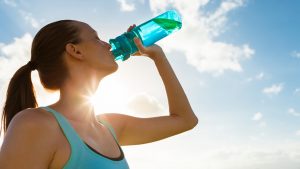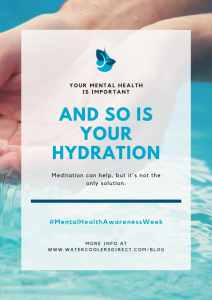Hydration helps with mental health and wellbeing
Our memory, energy, and ability to concentrate can suffer when we’re dehydrated. But recent research shows that our mental health, too, relies on adequate hydration levels.
Research tells us that drinking enough water can reduce the risk of depression and anxiety. And even mild dehydration takes its toll on our daily health and causes a dip in mood and anxiety.
We need to recognise the importance of mental health and wellbeing at work and how companies with a happy, healthy team are more successful and deliver better results. Better wellbeing can save money, increase productivity, make your team feel valued and more efficient.
Brain power
The brain is about 75% water so it’s easy to see why a lack of fluid could cause emotional processes to falter. It’s well known that hydration is the most important performance statistic for an athlete; likewise, your brain won’t perform at its best if it isn’t adequately hydrated.
Dehydration can cause a dip in energy levels and impact how your body absorbs food, which can make you feel low. Dehydration affects gut function, and there is a direct link between the gut and the brain. If you’re well hydrated, you have a lower risk of succumbing to chronic diseases and dementia and depression.
Good hydration helps your brain, which is particularly sensitive to changes in water balance, achieve better mental performance including concentration and alertness. Dehydration can seriously affect mood and behaviour making you feel tired, confused, and depressed.
Absence at work due to illness costs UK firms a staggering £45bn a year, according to Deloitte, with the average worker taking 4.4 days sick leave annually (source: ONS). Take care of employee welfare and wellbeing and this contributes to overall health so the team will be less likely to fall ill or suffer mental illness due to stress.
In a recent UK study research showed that many people were making unhealthy choices due to their work. There are many contributing factors, but the main offenders were an overwhelming workload, long hours, and an unhappy working atmosphere.
Of course, poor diet, lack of exercise, and not drinking enough water were also big influencers.
Head for better mental health
Some top tips on how you can increase workplace wellbeing and mental health.
- More natural light
- A vibrant selection of office flowers and plants
- Staff praise and reward
- A fun environment
- Fresh, chilled, and filtered drinking water readily available
Keep topped up
To stay hydrated in the workplace, make the most of the office water cooler or fountain or multi-function 3in1 and 4in1 boiling taps.
Enjoy fresh, chilled and filtered great tasing water. Remember to get up, walk around and stretch your legs and refill your reusable bottle. Set your smart app or Alexa to remind you every 60 or 90 minutes to drink more water to sup the daily recommended amount which is at least 2litres.
Before you rush out for a refill, it’s worth recognising the signs that mean you might be dehydrated. Don’t rely on thirst as a ‘time to drink’ alarm as this is quite unreliable. It’s better to check the colour of your wee: too dark and you’re not drinking enough.
If you enjoy hot drinks as well but find you don’t have the time to boil a slow kettle, then increase team productivity and swap to an instant boiling KettleTap and save time, money, and energy resources. Water as you want it.






